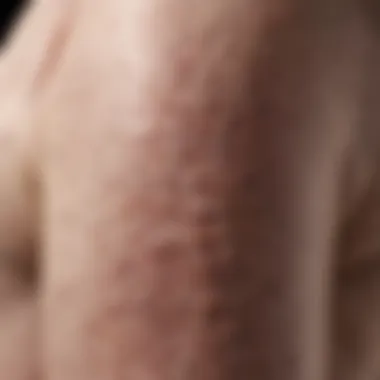Understanding the Link Between Psoriasis and Hair Loss


Intro
Psoriasis is a complex, chronic inflammatory skin condition that extends beyond mere skin symptoms. It affects millions of people worldwide, often leading to significant physical and emotional distress. One specific concern is its impact on hair health. Many individuals with psoriasis notice hair loss, raising the question of whether this phenomenon stems directly from the disease or as a byproduct of various surrounding factors. In this article, we will explore the intricate relationship between psoriasis and hair loss, aiming to provide a thorough understanding of the mechanisms involved and the implications for treatment and management.
Article Overview
Summary of Key Findings
Studies indicate a notable association between psoriasis and hair loss. The underlying inflammation in psoriasis can disrupt the hair growth cycle, leading to increased shedding or even conditions like telogen effluvium. Moreover, the treatments used to manage psoriasis can further complicate hair health. The psychological impacts of living with psoriasis, such as stress and anxiety, may also contribute to hair loss.
Research Objectives
The main objective of this research is to systematically examine how psoriasis interacts with hair growth mechanisms, assess the correlation between psoriatic flares and hair loss, and evaluate the various treatment approaches. This article seeks to provide clarity, guiding both healthcare providers and patients in understanding the significant yet often overlooked connection between these two conditions.
Key Results and Discussions
Main Findings
- Psoriasis can lead to a variety of hair loss types, including localized and diffuse thinning.
- Inflammation associated with psoriasis disrupts the hair follicle cycle, resulting in premature shedding.
- Treatments, particularly systemic therapies like methotrexate and biologics, can have adverse effects on hair health.
- Emotional distress and stigma tied to the visibility of psoriasis consequences can exacerbate psychological stress, further influencing hair loss.
Implications of Findings
"Recognizing the interplay between psoriasis and hair loss can make a significant difference in treatment outcomes and overall well-being for patients."
This comprehensive exploration aims to lay a foundation for future research and foster informed decision-making among affected individuals. As we delve deeper into the subject, the nuances of how psoriasis impacts hair health will become clearer.
Understanding Psoriasis
Understanding psoriasis is crucial for comprehending its potential impacts on hair health. This chronic skin condition is characterized by rapid skin cell proliferation, leading to red, flaky patches covered with scales. The intricate relationship between psoriasis and hair loss can be better appreciated when one acknowledges the underlying mechanisms, symptomatology, and types. Recognizing the nuances of psoriasis adds depth to our understanding of how it may adversely affect hair.
Definition and Types of Psoriasis
Psoriasis is primarily defined as an autoimmune disorder where the immune system triggers inflammatory pathways affecting the skin. There are several types of psoriasis, predominantly including:
- Plaque psoriasis: The most common form, presenting as raised, red lesions covered with silvery-white scales.
- Guttate psoriasis: Often starts in childhood or young adulthood, characterized by small, droplet-shaped lesions.
- Inverse psoriasis: Appears in skin folds, such as under the breasts and in the groin area, presenting as smooth, red patches.
- Pustular psoriasis: Characterized by white pustules surrounded by red skin.
- Erythrodermic psoriasis: A severe form that leads to widespread redness and shedding of the skin.
Each type has its distinct features and affects individuals differently. Understanding these variations aids in identifying the most appropriate treatment options and managing co-existing symptoms.
Pathophysiology of Psoriasis
The pathophysiology of psoriasis is complex, involving a combination of genetic, immune, and environmental factors. At its core, psoriasis results from an abnormal immune response that leads to inflammation. Key elements include:
- T-Cell Activation: CD4+ and CD8+ T cells become activated in the skin, contributing to inflammatory processes.
- Cytokine Release: Pro-inflammatory cytokines such as TNF-alpha, IL-17, and IL-23 play pivotal roles in perpetuating the inflammatory response.
This cascade leads to an accelerated turnover of skin cells, resulting in the visibility of lesions. The inflammation may also impact hair follicles, resulting in hair loss, which is particularly concerning for those already affected by this chronic condition.
Symptoms and Clinical Presentation
Symptoms of psoriasis extend beyond the visible psoriatic plaques. They can vary significantly among individuals. Common symptoms include:


- Red patches of skin covered with thick, silvery scales
- Dry, cracked skin that may bleed
- Itching and burning sensations
- Thickened, pitted, or ridged nails
- Swollen and stiff joints (in the case of psoriatic arthritis)
Clinical presentation is crucial for diagnosis and treatment. Recognizing how these symptoms may affect one's quality of life is essential, particularly when managing associated issues like hair loss.
The Hair Growth Cycle
Understanding the hair growth cycle is crucial when studying the relationship between psoriasis and hair loss. The cycle is complex and consists of various phases that determine the health and density of hair. Disruptions in this cycle can lead to thinning or loss of hair, particularly for those with psoriasis.
The phases of hair growth include anagen, catagen, and telogen, each serving a unique purpose. When psoriasis affects the skin, it can have direct or indirect implications on these hair growth phases. For instance, inflammation and excess skin cell turnover associated with psoriasis can hinder the anagen phase where hair is primarily produced.
Moreover, understanding the factors that influence hair growth is essential for recognizing how psoriasis can exacerbate hair loss. Changes in scalp conditions, hormonal fluctuations, and side effects from treatments can all shape the hair growth cycle.
Overall, grasping the nuances of the hair growth cycle helps in developing targeted strategies for managing hair health for those dealing with psoriasis.
Phases of Hair Growth
There are three primary phases of hair growth:
- Anagen Phase: This is the growth phase, which can last several years. The length of this phase contributes significantly to the final length of the hair that grows. If psoriasis interrupts this phase, hair may become finer or may stop growing altogether.
- Catagen Phase: This transitional phase lasts around two to three weeks during which the hair follicle shrinks and separates from the dermal papilla. Here, growth stops, and the hair prepares to shed.
- Telogen Phase: The resting phase lasts about three months. Hair that is in this stage eventually falls out, making way for new hair. Elevated stress and inflammation from psoriasis can push more follicles into this phase prematurely, resulting in increased hair shedding.
Factors Influencing Hair Growth
There are multiple factors that impact hair growth, including:
- Genetics: Inherited traits can determine hair thickness and growth rate.
- Nutritional Status: Vitamins and minerals play a pivotal role; deficiencies can cause hair to be weaker and thinner.
- Hormones: Hormonal levels impact hair growth cycles, especially during events like puberty or pregnancy.
- Health Conditions: Conditions such as psoriasis or other auto-immune diseases can directly affect hair growth.
- Medications: Certain treatments for psoriasis or related conditions may contribute to hair loss.
- Scalp Health: The condition of the scalp, influenced by psoriasis, can facilitate or impede hair growth.
The interplay between these factors and the hair growth cycle is vital for individuals with psoriasis, as it can guide effective interventions and cultivation of better hair health.
Psoriasis and Hair Loss
Understanding the connection between psoriasis and hair loss is vital for both patients and healthcare providers. Many individuals with psoriasis notice changes in their hair health alongside their skin symptoms. The interplay between these conditions can lead to various complications that affect mental and physical well-being.
The importance of this topic is not just academic; many who suffer from psoriasis also face the distressing possibility of hair loss. This can substantially affect self-esteem and overall quality of life. Hence, understanding this relationship can guide proper treatment choices and help mitigate unwanted effects.
Does Psoriasis Directly Cause Hair Loss?
Studies show that psoriasis does not directly cause hair loss in most patients. Rather, the inflammation associated with psoriasis may lead to hair thinning or shedding. The inflammatory process associated with psoriasis can impact the hair follicles, creating a hostile environment where hair growth might be compromised.
For example, individuals experiencing severe flare-ups may notice hair loss predominantly in affected areas. However, it is essential to differentiate between hair loss due to the condition itself and other factors, such as stress or medication related to treatment.
Secondary Effects of Psoriasis on Hair
The secondary effects of psoriasis on hair can be more pronounced than the primary relationship. Patients often use various treatments that may have side effects leading to hair loss.
- Medications: Some treatments might include corticosteroids or other immunosuppressive therapies which can contribute to hair loss.
- Physical irritation: Psoriasis plaques can lead to itching and scratching, resulting in hair breakage and loss.
"Addressing both psoriasis and any hair-related issues requires a whole-person approach, focusing on both physical and emotional health."
Understanding the layers of hair loss related to psoriasis is crucial. Both direct impacts and secondary effects should be evaluated to establish effective management strategies for patients.
By addressing both issues comprehensively, healthcare providers can create a more effective treatment plan that promotes better outcomes for individuals suffering from psoriasis while also nurturing hair health.


Mechanisms of Hair Loss in Psoriasis Patients
Inflammatory Response
The inflammatory response associated with psoriasis plays a key role in hair loss. In psoriasis, the immune system reacts abnormally, causing skin cells to multiply at an accelerated rate. This rapid turnover can lead to an accumulation of skin cells on the scalp, resulting in flakes and scaling.
- Cytokine Activity: Proinflammatory cytokines such as TNF-alpha and IL-17 are heavily involved. These signaling proteins can alter the hair follicle’s microenvironment.
- Impact on Follicles: The inflammation can disrupt the hair follicle cycle, leading to a condition known as telogen effluvium, where hair follicles prematurely enter the resting phase, resulting in noticeable hair shedding.
Additionally, when the scalp is inflamed, it may lead to itching and scratching, further exacerbating hair loss. Persistent scratching can damage hair follicles, predisposing them to permanent loss in some cases.
"Psoriasis-related inflammation not only attacks the skin but also serves an insidious function in hair follicle health, making this a multifaceted issue."
Medication Effects
The medication used to treat psoriasis can also influence hair health. Several therapeutic agents are employed for managing the symptoms of psoriasis. Their effects on hair health may vary significantly:
- Systemic Treatments: Drugs such as methotrexate and cyclosporine are often effective in controlling psoriasis but may induce hair loss as a side effect. These medications can inhibit cell proliferation, affecting hair follicles indirectly.
- Biologics: Targeted treatments like adalimumab and ustekinumab generally have a different impact. While they control psoriasis symptoms effectively, their effects on hair loss are less pronounced. Some studies suggest that biologics may even promote hair regrowth in certain patients as they reduce scalp inflammation.
- Topical Treatments: Corticosteroids and vitamin D analogs like calcipotriene may also be prescribed. While topical treatments generally help manage psoriasis, improper use can lead to side effects such as skin thinning, potentially affecting hair health over time.
In summary, there exists a complex interaction between psoriasis and hair loss driven by inflammatory processes and medication impacts. A deeper understanding of these mechanisms can help healthcare professionals create optimal treatment plans tailored to each individual’s needs.
Psychological Impact of Psoriasis-Related Hair Loss
The psychological ramifications of hair loss due to psoriasis are significant and often overlooked. For many individuals, hair is more than just a physical attribute; it is closely tied to their self-esteem and identity. When psoriasis leads to hair loss, it can exacerbate feelings of vulnerability and emotional distress. This section focuses on understanding the impact it has on body image and social interactions, highlighting why it is essential to address these issues in treatment plans and support systems.
Body Image Issues
Body image plays an integral role in how individuals perceive themselves and their interactions with the world. Psoriasis can change how someone views their body, and if it leads to hair loss, those challenges intensify. Individuals may feel less attractive or worry that others judge them based on their appearance. Such feelings often lead to
- Decreased self-esteem: Many patients report lower confidence levels as they struggle with visible skin issues and hair loss.
- Anxiety and depression: The distress of visible conditions can contribute to mental health disorders. Individuals might even avoid social situations due to worry about their appearance.
- Social withdrawal: Those affected may isolate themselves from family and friends, leading to feelings of loneliness.
These issues highlight the importance of recognizing the psychological component of psoriasis and hair loss. Providing support through therapeutic approaches or counseling can help patients rebuild their self-image and empower them to navigate the emotional landscape of their condition better.
Social Implications
The social consequences of psoriasis-related hair loss extend beyond personal feelings and into everyday interactions. Society often places emphasis on perceived attractiveness, and this can make those experiencing hair loss due to psoriasis more vulnerable. Common social implications include:
- Stigmatization: Individuals may face discrimination or judgment based on their appearance, affecting their social life.
- Impact on relationships: Relationships can suffer when the individual feels insecure or ashamed of their looks, which might push loved ones away.
- Work-related challenges: In some cases, visible skin conditions can influence professional opportunities or workplace dynamics.
"Understanding the psychological and social implications of psoriasis-related hair loss is crucial for beneficiaries and caregivers. Adjustments to treatment strategies can lead to improved mental health outcomes."
As we expand treatment options, discussions around hair loss must include resources that support emotional and social well-being, helping individuals adapt and maintain their quality of life even amid these challenges.
Managing Psoriasis and Hair Health
Managing psoriasis effectively can have a profound impact on hair health. The relationship between these two conditions reveals significant implications for individuals suffering from psoriasis. When psoriasis is controlled, not only can skin health improve, but hair loss may also be mitigated. This section will discuss treatment options, hair care strategies, and the overarching importance of ongoing management of psoriasis.
Treatment Options for Psoriasis
When addressing psoriasis, several treatment options exist. These range from topical therapies to systemic medications. The aim is to reduce inflammation and clear the plaques. The most common treatment options include:
- Topical Corticosteroids: These are often the first line of defense. They decrease inflammation and slow down skin cell turnover, allowing the skin to heal.
- Vitamin D Analogues: These help in managing the growth of skin cells. Calcipotriene is a widely used option.
- Phototherapy: Exposure to ultraviolet light can reduce psoriasis symptoms. Narrowband UVB is particularly effective for many.
- Systemic Medications: For moderate to severe cases, medications like methotrexate, cyclosporine, or newer biologics may be necessary. These act on overactive immune responses.


Choosing the right treatment depends on various factors, including the severity of psoriasis, individual health, and potential side effects. Regular consultations with dermatologists are crucial in adapting treatment plans as needs change.
Hair Care Strategies
Hair care practices play an important role for individuals with psoriasis. Not only can proper care help maintain hair health, but it can also promote self-esteem and comfort. Some effective strategies include:
- Gentle Cleansing: Use mild shampoos that do not contain harsh chemicals. Look for products specifically designed for sensitive scalps. Avoiding irritants can lessen scalp inflammation.
- Moisturizing Scalp: Keeping the scalp moisturized is key. This can prevent dryness linked to both psoriasis and hair loss. Oils like tea tree or coconut can provide nourishment.
- Avoiding Heat Styling: Limit the use of heat stylers like blow dryers or straighteners. Excessive heat can contribute to hair damage and exacerbate existing scalp issues.
- Regular Trims: Keeping the hair trimmed can help reduce the appearance of damage and make it easier to manage.
- Consult Professional Stylists: A stylist familiar with psoriasis can provide tailored advice, ensuring that hair care routines align with overall skin health.
Ultimately, integrating effective psoriasis management with proper hair care will significantly benefit those affected. This holistic approach not only focuses on physical health but also supports psychological well-being, leading to improved quality of life.
Clinical Perspectives on Psoriasis and Hair Loss
Psoriasis is not just a skin condition; it holds significance for hair health and the overall well-being of affected individuals. A clinical perspective on psoriasis and hair loss helps to underline critical factors, including the multifactorial nature of the relationship between these two health issues. Understanding this perspective is crucial for providing better patient care and treatment planning.
Healthcare professionals must recognize that psoriasis can have both direct and indirect effects on hair follicles, influencing hair growth cycles and leading to varying degrees of hair loss. Awareness of these factors encourages timely intervention and effective management. Moreover, clinical discussions around psoriasis can help patients navigate their treatment options and address any fears or anxieties related to hair loss.
Research Developments
Recent studies highlight the evolving science surrounding psoriasis and its impact on hair. Researchers have explored various mechanisms, including the role of immune responses and inflammation in hair follicle biology. For instance, the increased inflammation associated with psoriasis can disrupt the normal hair growth cycle, potentially causing telogen effluvium, a temporary type of hair loss.
Moreover, certain genes have been identified as playing a role in both psoriasis and hair conditions. There is a growing body of evidence suggesting that biological markers could predict whether a psoriasis patient is at risk for significant hair loss. Emphasis on genetic research may lead to personalized approaches in treatment. This opens new avenues for understanding why some individuals experience hair loss while others do not, despite having similar psoriasis severity.
"Understanding the genetic underpinnings provides a more tailored treatment strategy, helping optimize outcomes for psoriasis patients experiencing hair loss."
Future Directions in Treatment
Addressing hair loss in psoriasis patients requires a multifaceted approach. Future treatments will likely combine dermatological care tailored to psoriasis with strategies specifically aimed at hair health. Emerging therapies, such as biologics, could potentially change the landscape of treating both conditions. As research continues, there is promise in developing medications that not only target psoriasis but also support hair regrowth.
Additionally, patient education remains a vital component. Ensuring individuals understand the relationship between psoriasis flare-ups and hair loss can lead to proactive measures in their treatment plans. Health professionals can explore holistic measures, encompassing scalp care, nutrition, and stress management. Such strategies may further support hair growth alongside conventional treatments.
The future also points to greater integration of technology in monitoring treatment efficacy. Digital platforms and applications can facilitate tracking symptoms and treatment responses for both psoriasis and hair loss. This could ultimately inform more sophisticated, patient-centered healthcare strategies.
In summary, the clinical perspectives on psoriasis and hair loss highlight the importance of understanding the connections between these conditions. Continued research and future treatment advancements promise to enhance patients' quality of life, addressing their physical and psychological challenges.
Resources for Patients and Practitioners
The relationship between psoriasis and hair loss can be complex and often challenging. Access to adequate resources is crucial not only for patients suffering from these conditions but also for healthcare practitioners who must guide their treatment efficiently. This section discusses the importance of these resources, highlighting how they can benefit patients and practitioners in understanding and managing psoriasis-related hair health.
Before diving into specific resources, it is important to recognize that support systems can significantly impact the emotional well-being of individuals affected by psoriasis and hair loss. Patients often seek not only information but also connection and understanding from those who share similar experiences.
Support Groups and Organizations
Support groups and organizations provide a community for individuals dealing with psoriasis and its associated challenges, including hair loss. These groups offer various benefits:
- Emotional support: Sharing stories and experiences with others can alleviate feelings of isolation.
- Information sharing: Members can exchange tips and resources that have benefited them personally.
- Advocacy: Organizations may participate in advocacy efforts for better treatment options and increased awareness about psoriasis.
There are numerous reputable organizations, such as the National Psoriasis Foundation (www.psoriasis.org), which offer resources, support groups, and information on local events. Online platforms, like subreddits dedicated to psoriasis (reddit.com/r/Psoriasis), can also serve as an informal forum for questions and shared knowledge. Engaging in these communities allows patients to feel heard and understood.
Educational Materials
Accessing educational materials is essential for both patients and practitioners to enhance their understanding of psoriasis and its implications on hair health. Reliable educational resources help to demystify the condition, providing essential information on:
- Symptoms and triggers: Understanding common symptoms and what can exacerbate psoriasis can help in managing the disease.
- Treatment options: Knowledge of available therapies allows patients to make informed decisions about managing their health.
- Hair care techniques: Learning proper hair care practices can mitigate hair loss and improve overall hair health in psoriasis patients.
Many organizations provide printed and digital materials, from pamphlets to comprehensive guidebooks. Websites like Wikipedia (en.wikipedia.org) and Britannica (britannica.com) offer fact-checked articles that can lay the groundwork for further knowledge. Both patients and practitioners can benefit from ongoing education to stay updated with the latest research and treatment advancements.
"Education is the most powerful weapon which you can use to change the world."
This quote underscores the significance of knowledge, particularly in health management.







